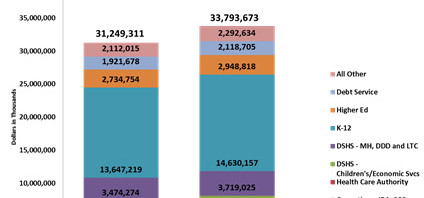-
This week in photos

-
A Day in the Legislature – Potato Day!
Today was “Potato Day.” The Potato Farmers of Washington hand out baked potatoes larded with condiments. The line stretches down the stairs of the rotunda and almost out the door. I passed on this opportunity and had a sandwich in my office. I’ll stand in line for the BBQ beef sandwich on “beef day” but…
-
Crosscut Event with Ross
CROSSCUT IN OLYMPIA Whet your whistle at the first member event in the capital Please join us for a glass of wine and conversation. Meet Rep. Ross Hunter, Chairman of the House Appropriations Committee, along with Crosscut’s team of editors and Olympia correspondents, and other state leaders. Crosscut is following this year’s legislative session closely…
-
Standardized Tax Rates for all Marijuana
Rep. Reuven Carlyle and I introduced legislation today to standardize state tax rates across medical and non-medical marijuana. The medical market would now look like the setup initiative 502 put in place for recreational use. The press release we issued is below. My concern is that if we have an identical product being sold with…
-
Legislative Update
We’ve gone through the first week. The governor and the state-wide officials have all been inaugurated, I fit into the same tuxedo I got married in 23 years ago for the inaugural ball, the Senate is in uproar about Senator Tom’s defection and the consequent change in partisan control, the sun came out (briefly) in…
-
Improving Gun Safety in Washington State
I’ve held off commenting on gun safety because I wanted to think about it for a while after the Sandy Hook incident. Writing new policy in knee-jerk response to a single incident typically is a bad idea. However, there have been enough incidents that I think we need to respond and create a safer place…
-
What’s in “McCleary?”
In 2012 the Washington State Supreme Court found that Washington State is not funding our education system at anything close to the level the constitution requires. Just before the holidays the court opined again, that “the overall level of funding remains below the levels that have been declared constitutionally inadequate.” (Washington State Supreme Court, 2012)…
-
Budget Outline 2013-15

In 2013 the Legislature has three big budget problems to address. It may be that there are other issues for the Legislature (gun safety, mental health, transportation…) but as the budget chair I have an odd focus on what I’m responsible for. Balance the 2013-15 budget, plus make sure that the 2015-17 budget is structurally…
-
Financial Management Software: Not Sexy but Good

The Washington Policy Center posted last week about State Auditor Brian Sonntag’s report to Governor Gregoire recommending financial management reforms. It’s a dry report filled with acronyms that’re geeky to both computer scientists AND to accountants. (This hides the fact that they’re talking about hundreds of millions in software development expense.) Jason Mercier, the director…
-
2013 Legislative Agenda
My agenda for 2013 is simple to outline here, but I expect great difficulties in working through it: Produce a budget that balances for 2013-15 and 2015-17, resolves the McCleary education funding decision, implements the Medicaid expansion envisioned in the Affordable Care Act (Obamacare), and projects rationally into the future. Inside the education box make some strategic…
